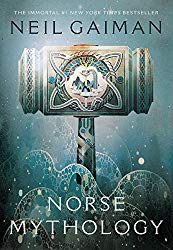“Norse Mythology” is a book by Neil Gaiman containing retellings of some of the stories from, well, Norse mythology. The stories have been told in a modern voice and are embellished with a humor that makes one break into a smile every now and then. The stories range right from the creation myths all the way to the final destruction (also known as Ragnarök). If you have been curious to know more about Norse mythology, this book should serve as a fine starting point. It also makes for a good book from which to tell stories to children and friends.
I first encountered elements of this mythology via Thor comics and Asterix. I later found out that The Lord Of The Rings was also influenced by it. The very first Linux distribution that I came across in the early days was named “Yggdrasil”. Of course, these days the biggest source of exposure to Norse mythology for most of us are the films from the Marvel Cinematic Universe (MCU). What many of us do not realize is that most of the names of the days of the week are also derived from the names of gods in this mythology. So it was natural for me to be curious to know more about this mythology.
Most of the stories in this collection feature Odin, Thor, and Loki. If you are only familiar with them via the MCU, you should know that they and their respective story arcs are quite different in this mythology. Interestingly, Mjölnir remains with Thor till the end here, there is no Stormbreaker to replace it, and people other than Thor are able to lift it as well. Another interesting thing (for Indians at least) that I learned from this book was that one of the sons of Thor was named Módi and he manages to survive Ragnarök.
The book combines a modern style of prose with a story-telling voice that makes for an easy and fun reading. The stories are quite fascinating, though after a while you wonder if the Norse gods would have been much better off just getting rid of Loki altogether early on in their saga. He is the chief troublemaker causing much misery all around, though he is also the god who gets them out of trouble at times. Truth be told, the stories just would not be as interesting to read without Loki there to spice things up.
The stories here would make for good ones to be retold to children and friends, although some parts might be a bit too dark for little children (e.g. Kvasir is a god who is slain and then his blood is drained out to make the mead of poetry). Whether you want to learn more about Norse mythology, or just enjoy some good stories, or are fans of Neil Gaiman or the MCU, you would be served well by this book. An enjoyable read that I would heartily recommend.
